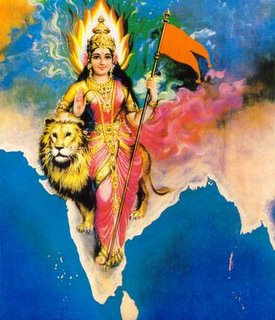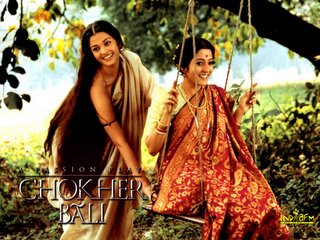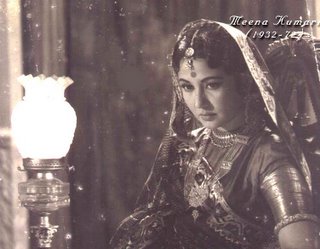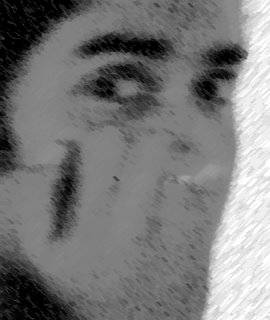

The other day while savoring a moderately tolerable Bengali fare in an eatery I was wondering why I don’t ever talk about the one thing in life I am most passionate about, FOOD, in my blog, and if I am talking about food why shouldn’t I talk about the cuisine I know the best ...
To a casual sampler Bengali cuisine is all about exotic preparations of fish in mustard sauce, most connoisseurs don’t bother exploring further, but if one were to do so one would discover a veritable subcuisine of vegetarian delights, Bengal is blessed with a natural vegetation which would put any greenhouse to shame,therefore vegetables are an important part of every Bengali meal, in fact everyday Bengali meals are characterized by the extensive use of vegetables, the focus is on the fine balance between nutrition and taste…
The starting course comprises something bitter, most commonly a shukto (yummm a vegetable stew with a bitter edge ,because of the use of korela , bitter gourd, in it) or nim begun (tender neem leaves fried with eggplants, yuck never could bring myself to like it).
Rice of course is the staple and remains so throughout the different courses. The shukto is followed by bhaja (fried anything ...yummm) and dal (umm a lentil soup) and then a torkari or chorchori which is generally a semi dry vegetable dish , and then comes the elaborate non vegetarian part (non vegetarian stuff is always so boring), fish in -kalia(semi sweet onion gravy with garam masala), malai curry(coconut gravy) ,bhapa(steamed mustard gravy), jhal(mustard gravy), jhol(relatively less spicy and the use of panch phoron, a typical Bengali spice, is a must), but even in the fish preparations there are incredible complications , some varieties of fish cannot be made in some gravies, ilish (hilsa)cannot ever be cooked in an onion gravy, that’s almost sacrilege in my mothers book…
Ok I wont talk about the meat dishes coz they gross me out…
I will make another post on Bengali sweets and chatnis, coz they deserve infinite amount of blogspace themselves…
Here are some Bengali staples I have been pining for…
Beguni; thin slices of eggplants dipped in gram flour batter and deep fried, served hot with rock salt sprinkled over it………(heaven)
Mochar ghonto : a true Bengali makes use of each and every part of the banana tree from the leaves (which is used as a plate sometimes) to the stem (called thor , it’s fried into a semi dry thingie which I hate)…but the piece de résistance is of course the dish made of banana flowers (mocha) yummmm, it has generous chunks of coconut too and is sometimes peppered with shrimps….
Plastic chatni : paper thin slices of raw papaya in sugar syrup, sounds awful , tastes heavenly, perfect accompaniment is of course fried papad (popadums).
Much muche alu bhaja: cylindrical shaped potatao crispies ,sounds like french fies but is infinitely better...
To be continued…
Tuesday, February 28, 2006
Posted by serendipiduous at 8:35 PM 11 comments
Sunday, February 26, 2006
An edited version of my last semster Film Analysis assignment...
“A straight gay flick” that’s how I described Latter Days to a friend of mine. This 2003 Hollywood release would certainly have been considered a mushy ‘chick flick’ if it had a straight relationship as its crux instead of a gay one.
Before I go onto analyse Latter Days as a chick flick let me try and understand the phenomenon that chick flicks are: Often considered an all-encompassing sub-genre, they mostly include dialogue-laden, formulated romantic comedies (with mis-matched lovers or female relationships), tearjerkers and gal-pal films, movies about family crises and emotional catharsis, some traditional 'weepies' and fantasy-action adventures, sometimes with foul-mouthed and empowered females, and female bonding situations involving families, mothers, daughters and children.
Now how does a gay romance fit into this mould you ask? Well by being faithful to the form of the genre and working around it to present an effective emotional drama .It has the mismatched lovers and is dialogue-laden, it has family crisis and its character go through emotional catharsis, and boy does the mother figure play an important role in the subconscious of the film!
As in all chick flicks there is a lot of self introspection and “coming in terms with” involved, however the female bonding part is replaced by male bonding in different levels. Primarily it’s the love intrigue, but then it’s also about two men from different social circumstances coming together and negotiating each others differences.
Christian, is that stock figure of gay drama, the hopelessly handsome party boy whose life is devoted to casual sex. A waiter in a Los Angeles restaurant owned and operated by the radiantly maternal Lila (the always welcome Jacqueline Bisset), Christian accepts a 50 bucks wager from his co-workers that he will be able to seduce Aaron (Steve Sandvoss), an apparently straight Mormon missionary who has moved into the apartment opposite his.
Following one of Hollywood's favourite clichés, what begins as a cynical bet develops into a deep romance. After some initial resistance, Aaron surrenders to Christian's charms, discovering his sexuality in the process. At the same time Christian discovers, in Aaron's sincerity and innocence, the deeper values that have been missing from his own life.
And the undercurrents of religious fanaticism and sexual prejudices add to the angst of the characters as in most chick flicks where the characters are helpless victims of social discriminations (divorcee, single mother, 30 something spinster, women in abusive relationships etc.) and have to take it in their strides to achieve individual goals. Christian is someone who thinks he has exorcised his evils but actually hasn’t, Aaron is someone who hasn’t even addressed them for the fear of discrimination. And that’s why the narrative is basically through his perspective.
The film opens with him coming to L.A. for the first time (his starry eyed view of the world giving away his inability to see things as they are). He, as he claims, sees the world in dots, the camera too blurs the city light into dots. His drive through the city which forms the title sequence is intercut with an sexual encounter of Chirstians’s, this format seemed particularly interesting to me because it seems to suggest that Aarons character is making a journey to a state of fulfillment the metaphor of which is Chirstian.
But suddenly 20 minutes down the film you realize that something has changed, the narrative shift is distinct, as Christian through his interactions with Aaron realizes that “sex is more than a handshake”, it becomes his journey too. We see him increasingly alone and in contemplative moods. The director therefore employs the emotional state of the protagonists as the narrative focus of the film.
The film’s subconscious it seems has its own tools of judging the characters, Chirstian, who was this roguish pretty boy was obviously being judged for his actions all this while, but the moment there is a turnaround he seems more …likable. Similarly the fall from grace of Aaron’s character was obviously not the kissing scene (where the other mormon missionary guys walk onto them) but his inability to recognize the possibility of a relationship between them, and from then onwards you somehow see his character as flawed. But the trial of fire for both these character is ironically the snow scene, where Christian having followed a disgraced Aaron to his hometown confronts him in the terrace of a snow covered terrace. Christian who hates snow (an element of psychoanalysis here which I will talk about later) overcomes his fears of it and makes a most heart rending proposal to Aaron. Aaron who is stigmatised and traumatized seems flummoxed. But both of them come out trumps when they end up making passionate love in a motel room. The audience is satisfied and not titillated with the consummation of their relationship because the subconscious of the film leads us to believe that this is right, these two poor souls should seek refuge in each others arms.
The love scene is followed by a conversation (another chick flick trademark) where Christian narrates his coming of story where his father plays an important role, the judgmental, homophobic, heterosexual father, whom Christian talks about so longingly brings into the mind of the Freudian concept of phallic stage where the male of the sex is the only object of attraction for both the sexes.
The conversation also acts as a tool for giving a sexual encounter some dignity, as opposed to Christian’s disillusionment with anonymous, conversation less sexual encounters and in corroboration to Aaron’s need to give meaning to everything.
Religion too is an important role player in the subconscious of the movie. A mormon missionary finds love in the most unmormonic way, and yet everything seems to be Gods doing. The little coincidences of Christian unconsciously doodling Aarons number while trying to find it and Aaron bumping onto Christian’s boss and thereby creating the possibility of their final coincidental meeting seem miraculous and magical. And essentially the movie is a lesson in Christian (as in the religion) way of living, i.e living a monogamous life, and yet it involves the most blasphemous and unnatural of relationships (in the Christian sense). No wonder I called it a straight gay movie.
As Christian’s African American roommate asks the Mormon sidekick what is the mormon stand on Gay rights an interesting conversation follows because here on subjugated (black ,woman)voice speaks for another(homosexual). Reinstating the fact that discrimination may be for different reasons, but the effect is the same.
The embedding of such social stand offers the viewer a stance and therefore makes him or her an active participator in the meaning making process of the movie. If I have some ideologies I will definitely be moved or affected if I see it being challenged and question. Therefore Christian’s Black roommate is just not a black roommate but a metaphor for cultural and social injustice.
Such symbolic devises used by directors not only guides the characters but also us the audience into the deeper layers of the film’s psyche, giving away its moral stance. Such emotional devises also helps in universalizing the movie watching experience but it must also be kept in mind that it never is tangential to the basic premise of the film.
Similarly the Sick man Christian delivers food to is just not sick man but he was as he himself says Christian ,”at some point of time, young pretty and reckless” but now he is just a skeleton of the past, a lesson for Christian of how things can go wrong if he carries on with his way of life.
The Sick guy (who is most probably an AIDS patient) mirrors the anxiety and confusion surrounding AIDS in the 80s and 90s. HIV/AIDS, at that time, almost invariably resulted in certain death, but was also the object which gay identity gathered around. There was a simultaneous need for stirring and subversive HIV/AIDS political activism, as well as comfort and normalisation in the face of a mortal threat.
And now we come to the mother figure (Aaron’s mother and Christian’s maternal boss), both these characters are important in typifying the maternal stereotypes, while Aaron’s mother is the voice of the society and cannot bring herself to accept her son’s abnormalities (but what will people say, don’t you see how people look away from us nowadays) Christian’s boss thinks that heaven wont be heaven without homosexuals. Aaron is driven to suicide after being shunned by her mother whereas a shaken Christian (after receiving a misunderstood news of Aaron’s death finds comfort in a conversation with his boss). The power of the mother figures over the boys is certainly not to be overlooked since they colour their worlds with their effect on them.
The use of LA as a backdrop is interesting and convenient too, convenient because it is after all seen as the city of dreams and is the hub of all glamorous activities, therefore attracting different kinds of people from different parts of the country, but also because of the dream it sell which sometimes turn sour (as old drifters carrying placards saying ‘welcome to hell’ would suggest). Christian’s workmate who is an aspiring actress (as all par time workers in LA are) never really gets the elusive ‘call back’. Similarly the mormon missionary team is to return empty handed without making any inroads in the most untrodden territory. A shallow and materialistic Christian has to be suitably un capitalized to be a true lover.As such the premise of a movie is primarily its character and their motivations, and Latter Days is no exception, however what makes it a departure is what it does within its premise…an interesting experimentation of one form (Gay films which are generally more serious angst ridden biopic like Naked Civil Servant or road movies like My Private Idaho(1991) )and efficiently moulds it onto the Chick Flick Mould .
Posted by serendipiduous at 10:26 AM 13 comments
Thursday, February 23, 2006

Amaar desh nei keno………
Mashi Ma: Shey kopal kore ki eshichish re desh bole tor achchei taki…
(Mashi Ma : You unlucky girl you don’t have a desh to go back to)
Ashalata: Keno nei keno? Mukuler desh achche, Harur Maar desh achche amaar desh nei keno?
(Ashalata:Why don’t I have a desh? Mukul has a desh, Haru’s mother has a desh, why don’t I have one?)
Rabindranath Tagore’s Chokher Bali.
Amaar desh nei keno…
is Kohima my desh, the sleepy hill town where I was born or is it Syhlet the Bangladeshi city my father hails from or is it Nawabdweep (the headquarters of Isckon) where my convent educated mother was born, or is it Kolkata a city i love and pine for and have spent my formative years in …or is it room no C 15 Ciefl men’s hostel, my sanctuary…
Binodini: ...ashole desh to moner moddhe naa re...
Or as Binodini says, maybe desh is what I come back to everyday…maybe desh is what i make of my world...
Posted by serendipiduous at 12:36 AM 3 comments
Wednesday, February 22, 2006
Monday, February 20, 2006

just wanted to add some colour and beauty to my blog...
God knows we all need a bit of colour and beauty in our lives....
Posted by serendipiduous at 10:03 AM 3 comments
Saturday, February 18, 2006

Aaj jaane ki zid na karo…
(Don’t insist on leaving tonight)
Yun hi pahlu mein baithe rahon
(Sit in front of me, don’t move)
Haay mar jayenge hum to loot jayenge
(Your departure will kill me ,devastate me)
Aisi baatein kiya na karo …
(Don’t even talk about it)
Tum hi socho zara kyun na roke tumhein
(Why shouldn’t I stop you from leaving)
Jaan jaati hain jab uth ke jaate ho tum
(When it kills me to watch you leave)
Tum ko apni kasam jaane jaa
(At least for your own sake)
Baat itni meri maan lo…
(Pay heed to my request)
Aaj jaane ki zid na karo
(Don’t insist on leaving tonight …)
Posted by serendipiduous at 10:53 PM 3 comments
Wednesday, February 15, 2006
Last night was fun…what started of as a deconstruction of valentines day exercise for ug, solan myriadmind and me ended up being one helluva day(we were consciously or rather solan and myriadmind were consciously trying not to indulge in any valentine day clichés, these rebels without a cause na, what do u say to them…I however dressed up for the occasion)…we dined and partied and partied and partied and then partied some more…
And then we decided to bunk classes and sleep, which we eventually didn’t (sleep that is) and now I am happy and tired with a song playing in my head (it’s the sutta song …bhai **** baap**** sutta na mila …its our post modern feminist version of it)…
Posted by serendipiduous at 8:02 PM 4 comments
Sunday, February 12, 2006
What do u do when there is a lot happening around you and u have a lot to say about these things but aren’t equipped with the vocabulary to verbalise your thoughts…you keep mum I suppose…so this is me keeping mum…
Posted by serendipiduous at 12:39 PM 2 comments
Monday, February 06, 2006
Am back…am glad I could meet some friends after a long time…am glad I didn’t end up making new friends …am glad I can now be indifferent to a city …am glad that finally, I feel only as much as I need to…
Posted by serendipiduous at 12:04 PM 2 comments

